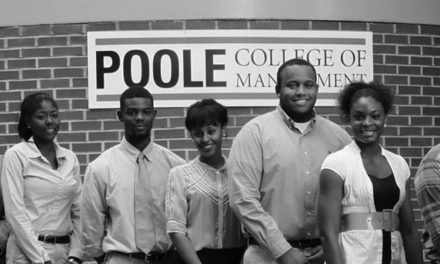Yolanda Ray
At 7:14 P.M. on September 1, 2010, Terrence Nelson, a junior in mechanical engineering, welcomed attendees to the fifth annual Learning the Ropes Workshop. The program was sponsored by the Xi Zeta chapter of Phi Beta Sigma Fraternity Inc. and co-sponsored by the Eta Omicron chapter of Alpha Phi Alpha Fraternity Incorporated. The purpose of this event was to help promote a smooth transition from high school to college, provide information about available resources, and introduce the importance of campus involvement to first-year students. Although the workshops’ intended audience is freshmen, the information is timeless and beneficial to everyone.
In the front of the classroom was a panel of distinguished faculty and student representatives of campus and student life, anxious to distribute information. and more importantly answers to any question the freshmen may have had. A number of diverse facilities/organizations were present at the program including the NCSU Libraries, University Police, Campus Recreation, the African American Student Advisory Council (AASAC), Student Media, National Society of Black Engineers (NSBE), club sports, and resident advisors from University Housing. Each panelist proceeded to explain what their facility or organization had to offer the campus community.
Adam Rogers, a representative from the D.H. Hill Library was asked, “Why do we still have libraries? Do you even need libraries with Google?” Ultimately, the D.H. Hill Library is a great physical space with over nine stories of book stacks and approximately four million books and volumes. The library incorporates both traditional and nontraditional areas in order to accommodate and appeal to the broad student population. Several services are offered such as access to borrow books and technology, group study space, printing, and ‘Ask a Librarian.’ Rogers stressed repeatedly, “We are here to help you, and we help hundreds of students’ everyday!” Each year the university spends millions of dollars to gain access to this information, and as students it is a gateway to incredibly expensive material.
There are 54 sworn police officers, which belong to an accredited police department on NCSU property. Our campus is not any different, crime occurs here just like there is crime abroad. The University Police presence is phenomenal and with the implementation of emergency blue lights, wolf alert, and the intercom system our campus is considered extremely safe. Most of the crime in our community can be attributed to personal and property theft, social networks, abusive relationships, and harassment. University Police helps combat crime through various programs, including their nationally recognized self defense team.
The introduction to Campus Recreation began the student life portion of the Learning the Ropes Workshop. Justin Wilson, a junior in Biological Sciences and marketing representative, explained that Campus Recreation is an organization designed specifically for students to stay fit, compete against other students, and other schools. Campus Recreation is its own entity and is separate from Carmichael Gymnasium. This facility offers amenities to students and faculty ranging from free fitness classes to outdoor adventures. The most popular activity within Campus Recreation is intramural and club sports. Kamau Brown, a member of the Water Polo team expressed the benefits of participating in club sports. Club sports permit leadership opportunities, athletic progress, and a chance to travel.
The African American Student Advisory Council or AASAC was also in attendance. AASAC is a round-table discussion with forty presidents representing all genres, unifying the African American community as one. Meetings are held bi-weekly and they address problems that are prevalent in the African American community on campus. These problems are then addressed with the Student Body president, and then lastly the Chancellor. There are many other programs that African American students can participate in such as the National Society of Black Engineers. NSBE is an international organization with over 35,000 members and aspires to continuously grow on our campus. Everyone can be a member of NSBE regardless of major and race.
To facilitate a safe environment for students to learn and grow is one of many responsibilities the resident advisors have. They also serve as residential mentors and host various programs in the different dormitories. Justin Watkins, a junior in Industrial Design informed the attendees that there are also different focus groups determined by the main population of that hall.
The success of this event can be recognized through the words of Obed Agyei, a freshman in Human Biology, “I learned that the library has a lot to offer, and to go there if you need help with research projects or technology.” This workshop offered valuable information to us all, for we must all continue to learn the ropes.


